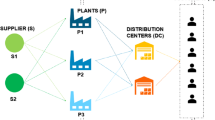Abstract
This paper addresses batch processing problem on the multimachine openshop. In the batch processing problem, jobs are categorized into batches and the batches are processed by machines. The processing time of each batch equals the maximum processing time of the batch jobs. The objective is to minimize the makespan. We assume non-identical processing time jobs. We used metaheuristic algorithms, including simulated annealing and genetic algorithms to solve the problem. Several numerical experiments show that for the small size problems, the proposed methods generate the solutions by no deviation or a little deviation from the global optimum. Furthermore, for the large-size problems, the proposed methods generate better solutions in a few times as compared to the commercial optimization software Lingo 8.
Similar content being viewed by others
References
Ikura Y, Gimple M (1986) Scheduling algorithms for a single batch processing machine. Oper Res Lett 5:61–65
Melouk S, Damodaran P, Chang P-Y (2004) Minimizing makespan for single machine batch processing with non-identical job sizes using simulated annealing. Int J Prod Econ 87:141–147. doi:10.1016/S0925-5273(03)00092-6
Kashan AH, Karimi B, Jenabi M (2008) A hybrid genetic heuristic for scheduling parallel batch processing machines with arbitrary job sizes. Comput Oper Res 35:1084–1098. doi:10.1016/j.cor.2006.07.005
Wang HM, Chou FD (2010) Solving the parallel batch-processing machines with different release times, job sizes, and capacity limits by metaheuristics. Expert Systems Appl 37:1510–1521. doi:10.1016/j.eswa.2009.06.070
Ridouard F, Richard P, Martineau P (2008) On-line scheduling on a batch processing machine with unbounded batch size to minimize the makespan. Eur J Oper Res 189:1327–1342. doi:10.1016/j.ejor.2006.06.080
Nong QQ, Cheng TCE, Ng CT (2008) An improved on-line algorithm for scheduling on two unrestrictive parallel batch processing machines. Oper Res Lett 36:584–588. doi:10.1016/j.orl.2008.03.004
Liu P, Lu X, Fang Y (2009) A best possible deterministic on-line algorithm for minimizing makespan on parallel batch. J Sched. doi:10.1007/s10951-009-0154-4
Damodaran P, Velez-Gallego MC (2009) Heuristics for makespan minimization on parallel batch processing machines with unequal job ready times. Int J Adv Manuf Technol. doi:10.1007/s00170-009-2457-1
Perez IC, Fowler JW, Carlyle WM (2005) Minimizing total weighted tardiness on a single batch process machine with incompatible job families. Comput Oper Res 32:327–341. doi:10.1016/S0305-0548(03)00239-9
Ren J, Zhang Y, Zhang X, Sun G (2009) Approximation algorithm for minimizing the weighted number of tardy jobs on a batch machine. Lect Notes Comput Sci. doi:10.1007/978-3-642-02026-1
Chiang TC, Cheng HC, Fu LC (2010) A memetic algorithm for minimizing total weighted tardiness on parallel batch machines with incompatible job families and dynamic job arrival. Comput Oper Res 37:2257–2269. doi:10.1016/j.cor.2010.03.017
Mathirajan M, Bhargav V, Ramachandran V (2009) Minimizing total weighted tardiness on a batch-processing machine with non-agreeable release times and due dates. Int J Adv Manuf Technol. doi:10.1007/s00170-009-2342-y
He CH, Lin Y, Yuan J (2007) Bicriteria scheduling on a batching machine to minimize maximum lateness and makespan. Theor Comput Sci 381:234–240. doi:10.1016/j.tcs.2007.04.034
Husseinzadeh Kashan A, Karimi B, Jolai F (2010) An effective hybrid multi-objective genetic algorithm for bi-criteria scheduling on a single batch processing machine with non-identical job sizes. Eng Appl Artif Intel. doi:10.1016/j.engappai.2010.01.031
Liu LL, Ng CT, Cheng TCE (2010) On the complexity of bi-criteria scheduling on a single batch processing machine. J Sched. doi:10.1007/s10951-010-0180-2
Chang P-C, Wang H-M (2004) A heuristic for a batch processing machine scheduled to minimise total completion time with non-identical job sizes. Int J Adv Manuf Technol. doi:10.1007/s00170-003-1740-9
Li L, Qiao F, Wu QD (2009) ACO-based multi-objective scheduling of parallel batch processing machines with advanced process control constraints. Int J Adv Manuf Technol. doi:10.1007/s00170-008-1904-8
Ahmadi JH, Ahmadi RH, Dasu S, Tang CS (1992) Batching and scheduling jobs on batch and discrete processors. Oper Res 39:750–763
Sung CS, Yoon SH (1997) Minimizing maximum completion time in a two-batch-processing-machine flowshop with dynamic arrivals allowed. Eng Optimization 28:231–243
Oulamara A, Finke G, Kuiteing AK (2009) Flowshop scheduling problem with a batching machine and task compatibilities. Comput Oper Res 36:391–401. doi:10.1016/j.cor.2007.10.006
Liao CHJ, Liao LM (2008) Improved MILP models for two-machine flowshop with batch processing machines. Math Comput Model 48:1254–1264. doi:10.1016/j.mcm.2008.01.001
Kumar Manjeshwar P, Damodaran P, Srihari K (2009) Minimizing makespan in a flow shop with two batch-processing machines using simulated annealing. Robot Cim-Int Manuf 25:667–679. doi:10.1016/j.rcim.2008.05.003
Liao LM, Huang CJ (2010) Tabu search heuristic for two-machine flowshop with batch processing machines. Comput Ind Eng. doi:10.1016/j.cie.2010.03.004
Liu B, Wang L, Liu Y, Qian B, Jin YH (2010) An effective hybrid particle swarm optimization for batch scheduling of polypropylene processes. Comput Chem Eng 34:518–528. doi:10.1016/j.compchemeng.2009.12.010
Sung CHS, Kim YH (2003) Minimizing due date related performance measures on two batch processing machines. Eur J Oper Res 147:644–656. doi:10.1016/S0377-2217(02)00352-1
Strusevich VA (2000) Group technology approach to the open shop scheduling problem with batch setup times. Oper Res Lett 26:181–192
Averbakh I, Berman O, Chernykh I (2005) A 6/5-approximation algorithm for the two-machine routing open-shop problem on a two-node network. Eur J Oper Res 166:3–24. doi:10.1016/j.ejor.2003.06.050
Gribkovskaia IV, Lee CHY, Strusevich VA, de Werra D (2006) Three is easy, two is hard: open shop sum-batch scheduling problem refined. Oper Res Lett 34:459–464. doi:10.1016/j.orl.2005.07.006
Mosheiov G, Oron D (2008) Open-shop batch scheduling with identical jobs. Eur J Oper Res 187:1282–1292. doi:10.1016/j.ejor.2006.03.068
Kirkpatrick S, Gelatt CD, Vecchi MP (1983) Optimization by simulated annealing. Science 220:671–680
Author information
Authors and Affiliations
Corresponding author
Electronic supplementary material
Below is the link to the electronic supplementary material.
ESM 1
(XLS 36 kb)
Rights and permissions
About this article
Cite this article
Khormali, A., Mirzazadeh, A. & Faez, F. The openshop batch processing problem with non-identical processing times, using simulated annealing and genetic algorithms approaches. Int J Adv Manuf Technol 59, 1157–1165 (2012). https://doi.org/10.1007/s00170-011-3548-3
Received:
Accepted:
Published:
Issue Date:
DOI: https://doi.org/10.1007/s00170-011-3548-3




